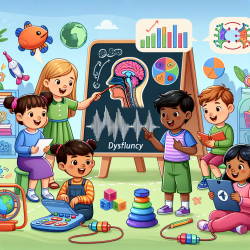Fluency disorders in children, such as stuttering, often challenge speech therapists and educators to seek innovative treatment methods. Recent research by Jones-Prus (1980) offers valuable insights into treating dysfluency by training fluency as a motor skill. This approach focuses on enhancing the coordination of respiration, phonation, and articulation, which are critical components of fluent speech.
The study targeted young children with abnormal dysfluency, demonstrating considerable speech fragmentation and a nascent awareness of their speech difficulties. By employing a mix of less direct and more direct treatment approaches, significant improvements in fluency skills were noted. These included:
- Using conditions that facilitate fluency skills, such as rhythm, slow prolonged speech models, choral speaking, and singing.
- Gradually increasing the length and complexity of utterances.
- Improving breath control for speech purposes through passive airflow techniques.
One of the study's key findings is the importance of not solely focusing on controlling stuttering but rather on the total process of talking. This shift in focus helps in reinforcing fluency skills, making them self-reinforcing, and thereby reducing stuttering behavior. Moreover, the study underscores the reluctance of speech-language pathologists to work with young dysfluent children, highlighting the need for more direct treatment methods that address the motor planning difficulties associated with dysfluency.
Implementing the outcomes of this research in therapeutic settings could involve:
- Integrating motor skill training in fluency enhancement programs.
- Adopting a holistic approach that considers the coordination of respiration, phonation, and articulation.
- Utilizing novel stimuli and overlearned materials to facilitate the practice effect and simplify motor planning for fluent speech production.
For practitioners, this research emphasizes the importance of exploring and implementing motor skill training in treating dysfluent children. It provides a compelling rationale for focusing on the total process of talking and offers practical strategies for enhancing fluency through a motor skill training approach.
Further research and practice in this area could significantly improve the outcomes for children with fluency disorders, offering them a smoother path to effective communication. For those interested in delving deeper into this innovative approach to fluency training,
To read the original research paper, please follow this link: Training Fluency as a Motor Skill in the Treatment of Dysfluent Children.










